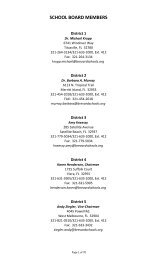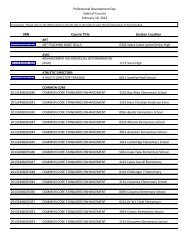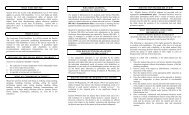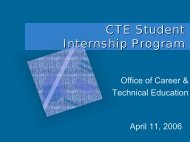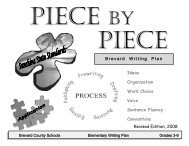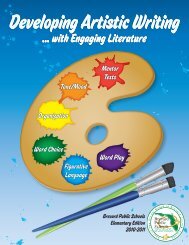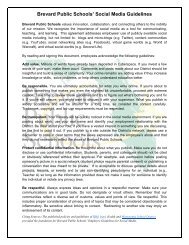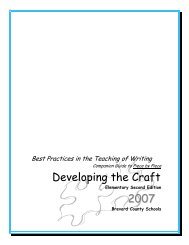2007-08 K-12 Comprehensive Research-Based Reading Plan
2007-08 K-12 Comprehensive Research-Based Reading Plan
2007-08 K-12 Comprehensive Research-Based Reading Plan
Create successful ePaper yourself
Turn your PDF publications into a flip-book with our unique Google optimized e-Paper software.
High School Assessment, Curriculum, and InstructionSuccessful implementation of Brevard Public Schools’ K-<strong>12</strong> <strong>Comprehensive</strong> <strong>Research</strong>-<strong>Based</strong> <strong>Reading</strong> <strong>Plan</strong> will meet the requirements of the Florida Secondary SchoolRedesign Act, which requires each school to use research-based reading activities thathave been shown to be successful in teaching reading to low-performing students.Students entering the upper grades who are not reading on grade level have a variety ofreading intervention and learning needs. A single program or strategy is not sufficientfor remediation; therefore, it is necessary to implement a combination of research-basedprograms and strategies that have been proven successful in the remediation of olderstruggling readers. Likewise, remediation is not sufficient to meet the learning needs oflow-performing high school students who are simultaneously preparing for graduationand college/career readiness. In addition to focusing on basic literacy skills, instructionneeds to engage students in complex cognitive tasks that challenge them to apply theirliteracy skills toward high-level thinking while relating to complex text. Suchinstruction expands literacy development beyond basic skills to include capacities thatbetter prepare them for both graduation and college/career coursework such as: general academic and discipline-specific vocabulary, including technicalterms extracting and using information from informational and technical textshigh-level comprehension and critical literary analysisstudent question generation, inquiry, and research processes for validationand corroboration of complex informationIn order to simultaneously offer reading intervention and cognitive challenges, highschool reading instruction needs to incorporate the use of an integrated andinterdisciplinary approach:1. Integrated approach to the language arts strands and skills (reading, writing,listening, speaking): High schools will integrate opportunities for students to apply thecomposite use of these skills they are learning in order to further strengthen theiroverall literary development.2. Interdisciplinary approach: High school literacy instruction needs to attain a balanceof literature and informational texts in history, social studies, and science. Thisinterdisciplinary approach to literacy is based on extensive research that establishes theneed for students to be proficient in reading complex informational text independentlyin a variety of content areas in order to be college and career ready by the time theygraduate.Using this integrated, interdisciplinary approach requires systematic studentengagement in complex cognitive tasks with a wide variety of different types of texts.Teachers will also need to incorporate texts of varying levels of complexity into theirinstruction, providing various instructional opportunities for students to read, write,discuss, and listen to text for different specific purposes. This includes but is notlimited to focusing on: new and more complex text structures (single or multiple organizationalpatterns in text) vocabulary and concepts on social studies and science topics how to extract information from complex informational text33 | P a g e




